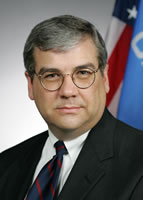In order to provide equal access and equal opportunity to people with diverse abilities, this site has been designed with accessibility in mind. Click here to view
Senate bill would provide caregiver training for vets with PTSD and TBI
 Sen. Brian Crain
Sen. Brian Crain
The full Senate is the next stop for a bill creating two pilot programs to help Oklahoma National Guardsmen returning from duty with either Post Traumatic Stress Disorder (PTSD) or Traumatic Brain Injury (TBI). Sen. Brian Crain, Chairman of the Health and Human Services Committee won passage for Senate Bill 527 in Senate Appropriations on Wednesday. He said the University of Oklahoma would administer the programs.
The National Center for PTSD reports victims may relive traumatic events, or avoid situations that remind them of the event. They may suffer from depression or anxiety and have problems with employment, relationships or substance abuse.
“We have some heroes in the National Guard who are having a difficult time after surviving the horrors of war. In the past PTSD was referred to as battle fatigue, and soldiers didn’t really get the help they needed,” said Crain, R-Tulsa. “Now we understand much more about this condition, and we want to make sure that guard members returning to our state with PTSD as well as those who have suffered TBI get the best care possible.”
According to the Department of Veterans Affairs, the conflicts in Iraq and Afghanistan have resulted in increased numbers of veterans with TBI, with 22 percent of all combat casualties from these conflicts suffering from brain injuries, compared to 12 percent of Vietnam related combat casualties. Symptoms can include headaches, tinnitus, insomnia, memory and concentration difficulties and emotional/behavioral problems, including irritability, depression, anxiety and behavioral issues. Patients with TBI are also at increased risk for PTSD.
“When you start talking about the injuries that are being inflicted, these aren’t missile attacks, these are roadside bombs intended to destroy a hummer or kill small groups of people, and the result is higher numbers of TBI cases,” Crain said. “We need more caregivers who are trained to deal with TBI, and that’s what this bill will help us do."
 Oklahoma Senate
Oklahoma Senate

